Strategy in AI’s Shifting Sands: Part 3 – How GCC Pioneers Are Ushering In A New Wave Of Innovation
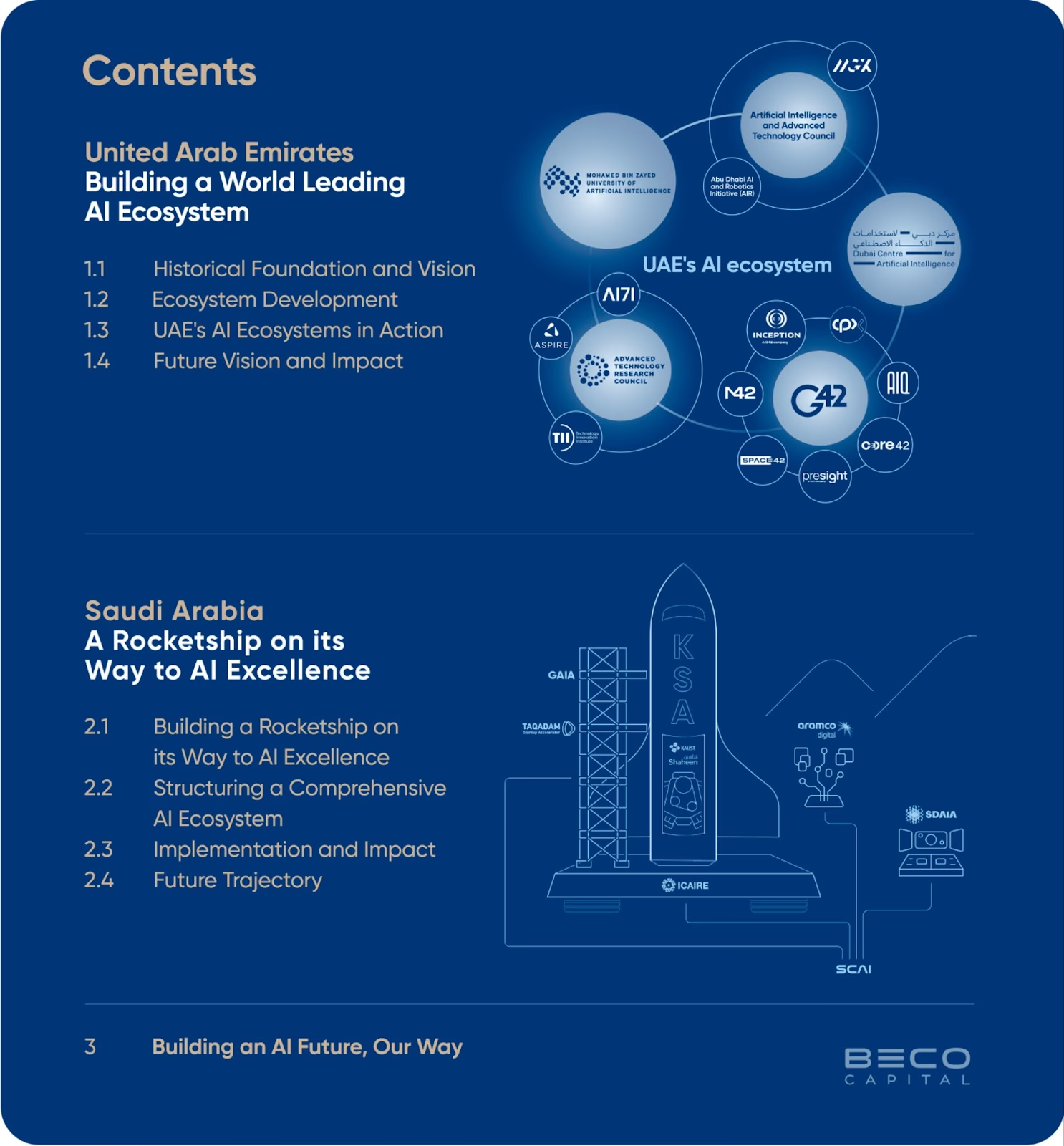
United Arab Emirates
1.1 Historical Foundation and Vision
1.1.1 Early Strategic Initiatives
The UAE’s journey into AI began in earnest in 2017 with two groundbreaking initiatives:
the appointment of His Excellency Omar bin Sultan Al Olama as the world’s first Minister of State for Artificial Intelligence, and the launch of the UAE Strategy for Artificial Intelligence 2031.
These moves underscored the UAE’s commitment to becoming a global AI leader and set the stage for a cascade of innovative developments. The strategy established a comprehensive blueprint for positioning the UAE as a global hub for AI research and development, with a clear focus on attracting top AI talent and fostering collaboration between academia and industry.
Since 2017, the UAE has meticulously assembled the building blocks to transform itself into an AI-first nation. Given the dynamic nature of AI technology (as explored in Part One and Part Two), this systematic approach represents a remarkable achievement. The UAE’s vision centers not on simply adopting AI technology but on becoming the world’s most prepared nation for the AI era. This emphasis on preparedness reflects a deliberately measured approach, highlighting the UAE’s thoughtful and intentional path from research to implementation and monetization. It also cements the UAE’s position at the forefront of sovereign AI internationally, placing it well ahead of established global peers.
1.1.2 Decades of Insight Light The Way
While 2017 marked the formal launch of the UAE’s AI strategy, the nation’s technological foresight and strategic investments trace back to the early 2000s, laying crucial groundwork for today’s AI initiatives.
A decisive moment came in 2007 with Mubadala’s acquisition of an initial 8.1% stake in AMD (boosted to 19.3% the next year), followed by the creation of GlobalFoundries in 2009; a spin-off from AMD’s semiconductor manufacturing business. These investments weren’t merely financial plays; they represented the UAE’s early recognition of technology’s critical role in shaping the future global economy. Though neither AMD nor GlobalFoundries established physical operations in the UAE, these strategic moves provided the country with invaluable insight into cutting-edge technological advancements and industry dynamics.
This early involvement proved prescient, positioning the UAE to capitalize effectively on the subsequent wave of technological innovation, particularly in AI. The investment in foundational technologies such as semiconductors – crucial components for AI hardware – helped build the institutional knowledge and expertise necessary to understand and leverage AI advancements. These early ventures served as a learning laboratory, developing the muscle memory that would later enable the UAE to move swiftly and decisively in the AI space.
The lessons learned from these strategic investments enabled the UAE to rapidly adopt and integrate AI technologies across various sectors, from smart cities to healthcare and government services. Moreover, many of the individuals who were involved in the AMD transaction now lead many of the UAE’s AI investment entities. This historical context helps explain the sophistication and well-placed confidence with which the UAE has approached its AI initiatives since 2017, building upon two decades of technological investment and learning.
This combination of early strategic investments and focused research initiatives has created a powerful foundation for the UAE’s AI ambitions. The foresight to engage deeply in the AI ecosystem well before it became a global priority is now paying significant dividends. Today, the UAE stands not merely as an adopter of AI technology but as an influential leader capable of both deploying sophisticated AI solutions and helping shape the global AI agenda. The nation’s journey from technology investor to AI pioneer demonstrates how visionary leadership and systematic execution can transform ambitious goals into technological leadership.
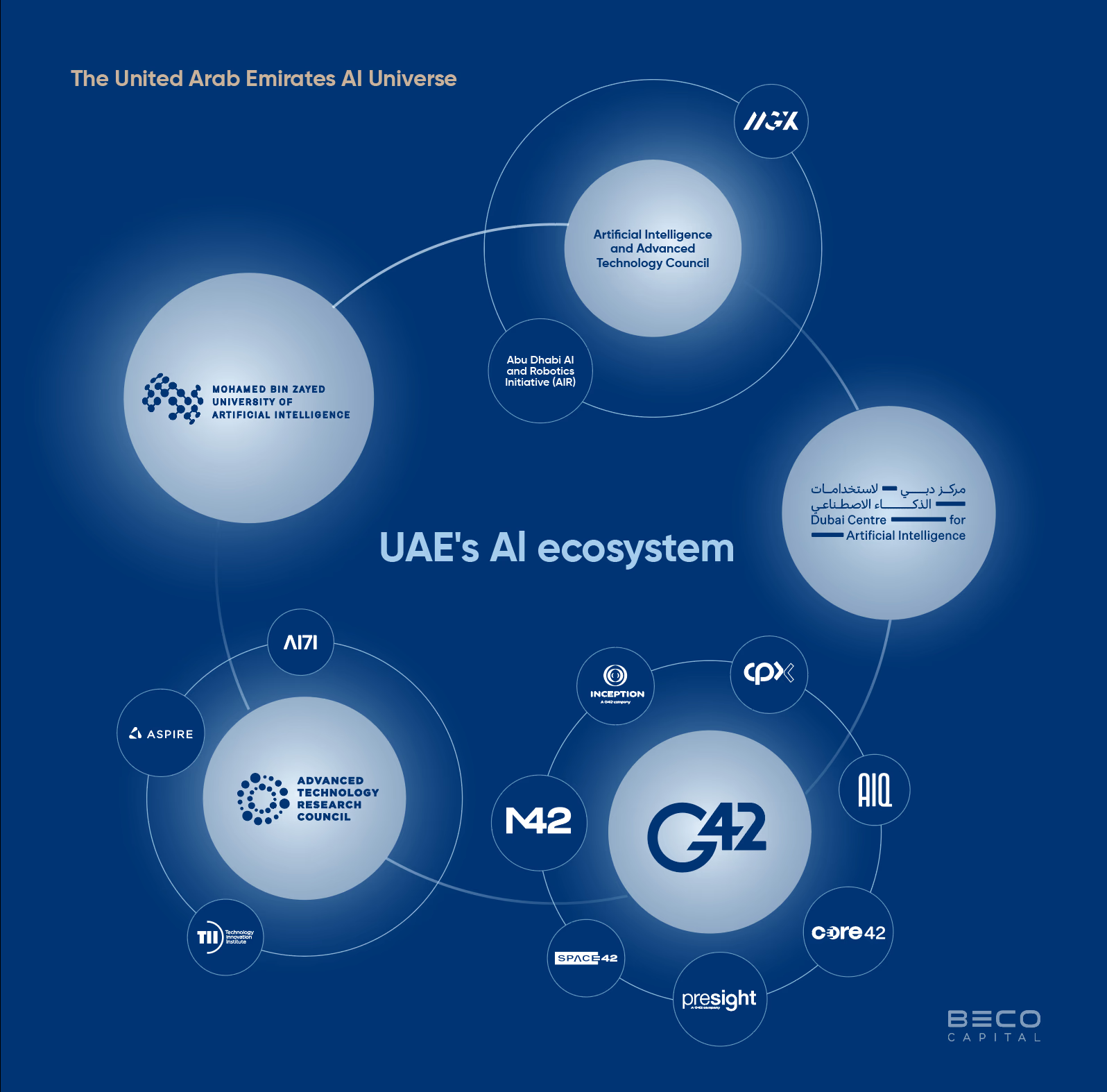
1.2 Ecosystem Development
From vision through to application, the UAE has transformed its AI ambitions into actionable research capabilities and internationally acclaimed innovations.
The UAE’s AI ecosystem revolves around three key pillars, encompassing academia (MBZUAI), research and commercialization (ATRC, G42), and infrastructure investment (AIATC). We’ll spotlight these core nodes, while acknowledging the valuable contributions of other entities actively engaged in relevant research and innovation.
1.2.1 Academia & Research
The cornerstone of this academic ecosystem is the Mohamed bin Zayed University of Artificial Intelligence (MBZUAI), established in 2019.
As the world’s first graduate-level university dedicated exclusively to AI, MBZUAI exemplifies how the UAE has moved beyond policy frameworks to create specialized institutions that drive innovation. MBZUAI stands out for its remarkable concentration of global AI talent across key disciplines, comparable to leading institutions worldwide. The university is broadening its academic scope with the addition of new departments, each led by renowned experts in their fields. For example, Professor Elizabeth Churchill, formerly Senior Director of UX at Google, now heads the Human-Computer Interaction Department.
In 2023, the university launched the MBZUAI Incubation and Entrepreneurship Center (MIEC), the region’s first AI-native incubator. MIEC recently announced its AI Mentors Network, which includes BECO Managing Partner Abdulaziz Shikh Al Sagha. As Abu Dhabi continues to cement itself as a hub for AI, we at BECO are excited about the future founders who will emerge from MBZUAI and are pleased to work closely with them to help solidify this vision.
This academic foundation gained additional momentum with the 2020 establishment of the Advanced Technology Research Council (ATRC). Through its network of specialized entities – the Technology Innovation Institute (TII), ASPIRE, VentureOne, and AI71 – ATRC has created a comprehensive framework that transforms world leading research insights into market-ready solutions.
1.2.2 Commercialization
Through its specialized subsidiaries, G42 demonstrates the UAE’s ability to translate AI innovation into practical solutions across multiple sectors. This commercial foundation is further strengthened by ATRC’s strategic approach to market development, providing a robust pathway for converting research breakthroughs into commercially viable applications while maintaining strong data sovereignty principles.
1.2.3 Investment
The 2023 launch of the Dubai Center for Artificial Intelligence (DCAI) marked another strategic advancement in the UAE’s AI ecosystem.
DCAI serves a unique dual role; while advancing Dubai’s position as a key AI hub, it also functions as a crucial regulatory and innovation bridge within the national framework. By establishing legislation, cultivating global partnerships, and developing national talent in coordination with other UAE initiatives, DCAI helps ensure that the UAE’s rapid AI advancement proceeds within a robust regulatory framework.
The establishment of the Artificial Intelligence and Advanced Technology Council (AIATC) in 2024 demonstrates the UAE’s evolution from strategic investor to architect of global AI development. Through AIATC’s Abu Dhabi AI and Robotics Initiative (AiR) and its MGX investment vehicle, AIATC exemplifies a sophisticated approach to AI investment that prioritizes both technological sovereignty and global collaboration. This represents a strategic shift from traditional investment to ecosystem building, focusing on critical infrastructure, semiconductor development, and foundational technologies that will shape the future of AI development.
1.3 UAE's AI Ecosystems in Action
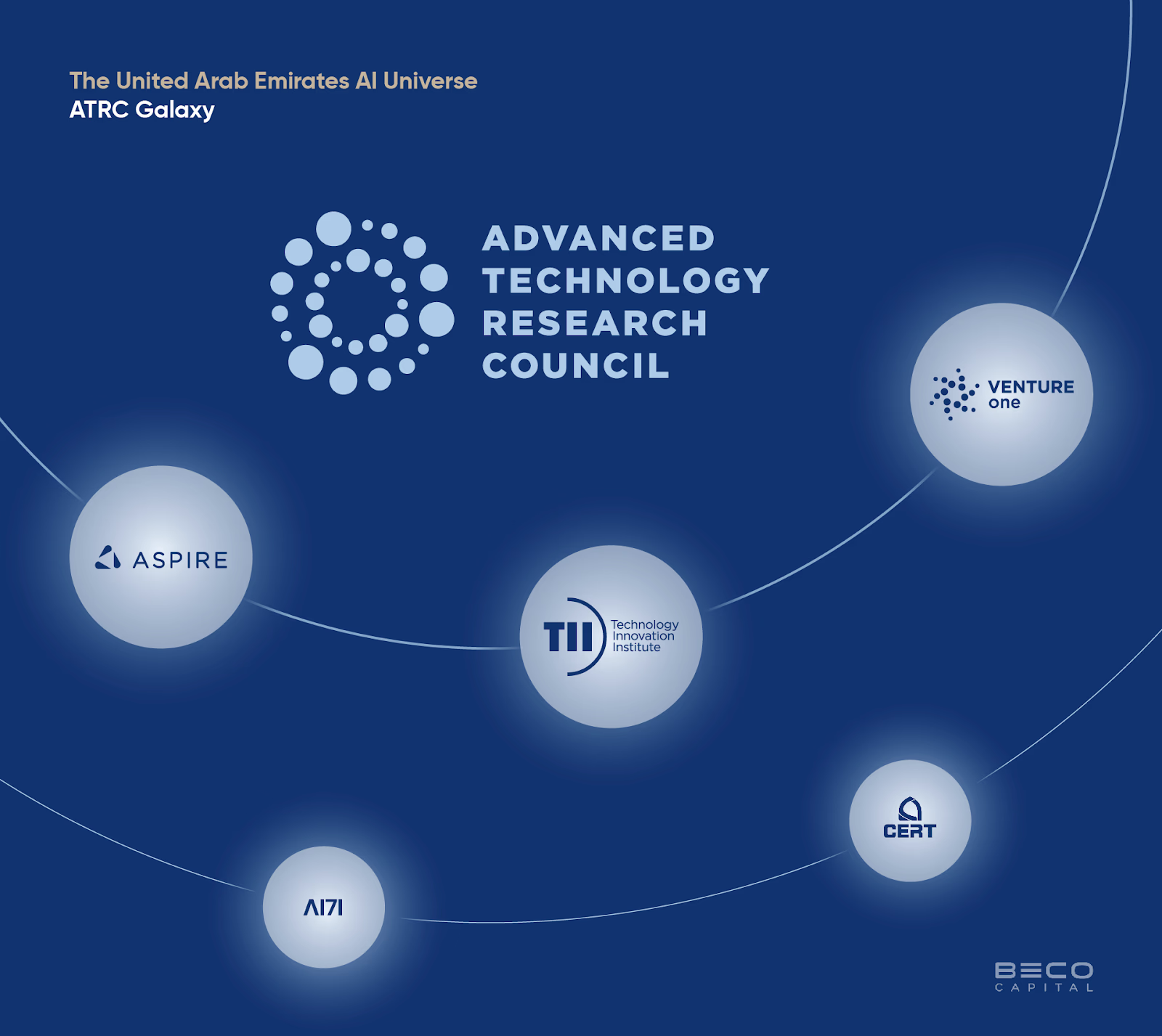
1.3.1 The ATRC Ecosystem
Building on its strong research foundation and early technological investments, the UAE’s journey in AI has evolved through distinct phases, each marked by strategic developments and growing capabilities.
- The first phase focused on establishing research excellence and attracting world-class talent; a phase that remains “always on”. A cornerstone of this phase has been ATRC’s Technology Innovation Institute (TII), which has successfully attracted some of the world’s best researchers across 10 research centers, including AI and Digital Science, to drive applied R&D. By creating dedicated research institutions and fostering an environment conducive to innovation, the UAE successfully draws leading minds in AI and related technologies, especially talented researchers from Europe, Asia and North Africa. This approach marked a significant shift from being primarily a technology consumer, to becoming an active contributor and thought leader in global AI development.
- The second phase, currently underway, centers on commercialization and practical application of AI technologies. This evolution mirrors global AI development patterns but with a distinctive regional approach that emphasizes open collaboration and practical implementation. What sets the UAE apart is the speed and intentionality of this transition, supported by well-funded, coordinated entities working across the AI value chain. This is exemplified by the ATRC’s commercialization strategy for the Falcon LLM; VentureOne, ATRC’s commercialization arm, was established to bridge the gap between research and market application, whereas AI71 focuses on making advanced AI technology accessible while ensuring decentralized AI data control for enhanced privacy. Through Locai, an artificial intelligence business solutions company, AI71 has developed sector-specific solutions built on the Falcon LLMs, spanning healthcare, education, and legal sectors.
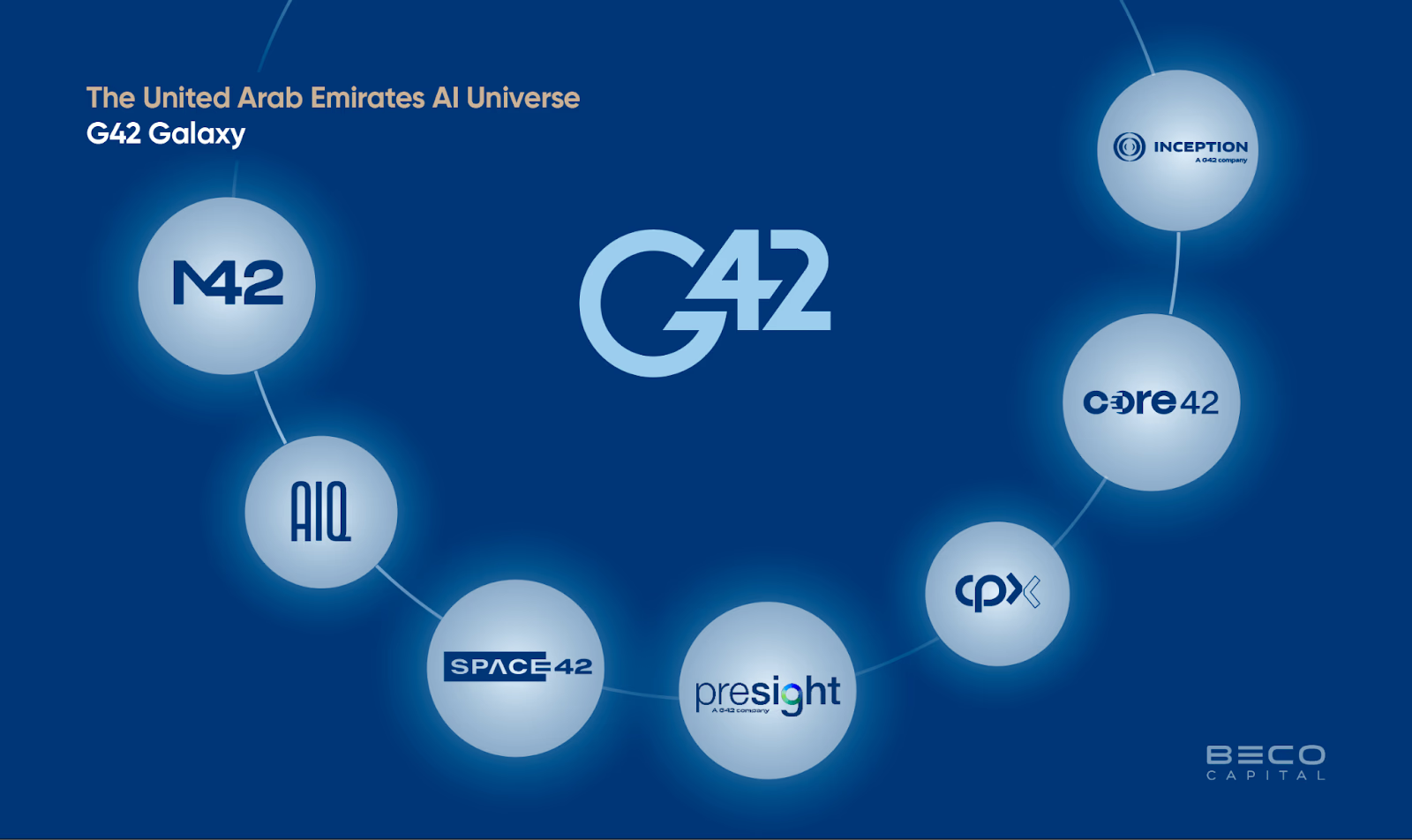
1.3.2 The G42 Ecosystem
Through its diverse subsidiaries including Core42, Presight, and M42, the company has established significant global partnerships and developed innovative AI solutions. Microsoft’s $1.5 billion investment in G42 earlier this year underscores the UAE’s growing influence in the global AI landscape.
- Core42, formerly known as G42 Cloud, provides the technological infrastructure and computing power that underpins advanced AI operations, while also developing specialized AI models like the Jais LLM (more on LLMs in subsequent sections). Presight leverages big data analytics and AI to transform sectors ranging from public services to sports analytics. In healthcare, M42 has pioneered AI-driven solutions for medical imaging, diagnostics, and personalized medicine, demonstrating the practical impact of AI in critical sectors. Within space, Space42 is an AI powered spacetech company that integrates satellite communications, geospatial insights and AI for global customers in over 150 countries.
- G42’s strategic vision extends far beyond regional borders, anchored by carefully cultivated global partnerships. In addition to its groundbreaking collaboration with Microsoft, G42 has forged alliances with leading technology players such as Nvidia, Qualcomm, and Cerebras. Notably, Cerebras – who recently filed for a US IPO – disclosed that 87% of its H1 2024 revenues were driven by its partnership with G42, thus underscoring the pivotal role G42 plays in the success of its partners. These collaborations have enabled critical knowledge exchange, accelerated innovation, and elevated the UAE’s standing as a global hub for AI technology. By fostering these impactful relationships, G42 demonstrates how commercial enterprises can simultaneously advance cutting-edge technology, create economic value, and align with national AI ambitions.
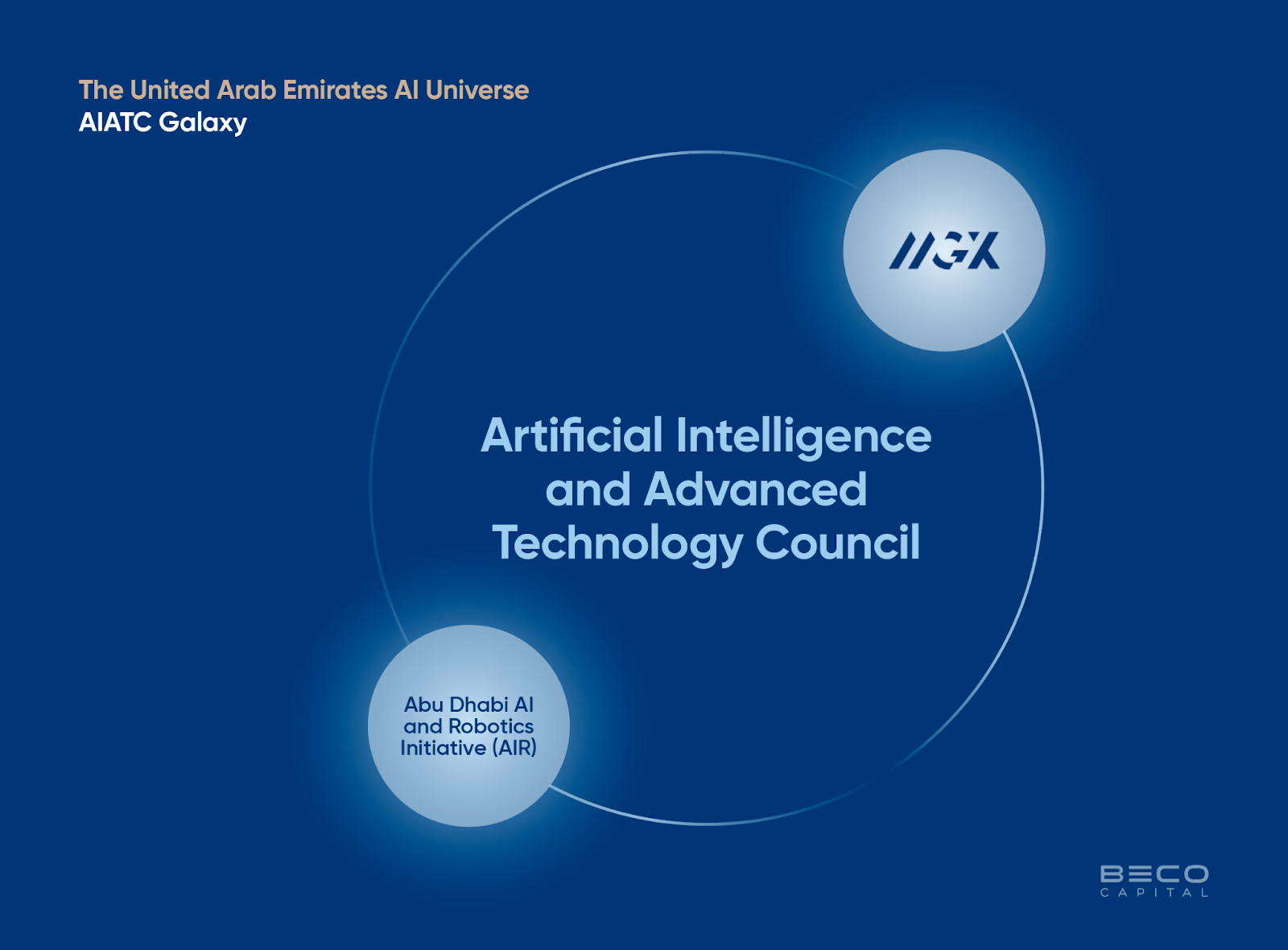
1.3.3 The AIATC Ecosystem
The Artificial Intelligence and Advanced Technologies Council (AIATC), launched in January 2024, represents the next evolution in the UAE’s AI strategy.
Through its AiR initiative and MGX investment vehicle, AIATC aims to accelerate AI development across infrastructure, semiconductors, and core technologies.
With MGX targeting over $100 billion in assets under management and leveraging partnerships with Mubadala and G42, MGX embodies the UAE’s commitment to building a comprehensive AI ecosystem that spans fundamental infrastructure to high-impact applications. This commitment was further demonstrated by MGX’s participation in OpenAI’s historic $6.6 billion funding round – the largest venture capital deal ever – which valued OpenAI at $157 billion as well as their $500 million investment into Databrick’s recent $10 billion funding round (at a $62 billion valuation). Alongside global technology leaders like Microsoft and NVIDIA, MGX’s strategic investment reinforces the UAE’s position at the forefront of global AI development and its ability to forge partnerships with industry pioneers.
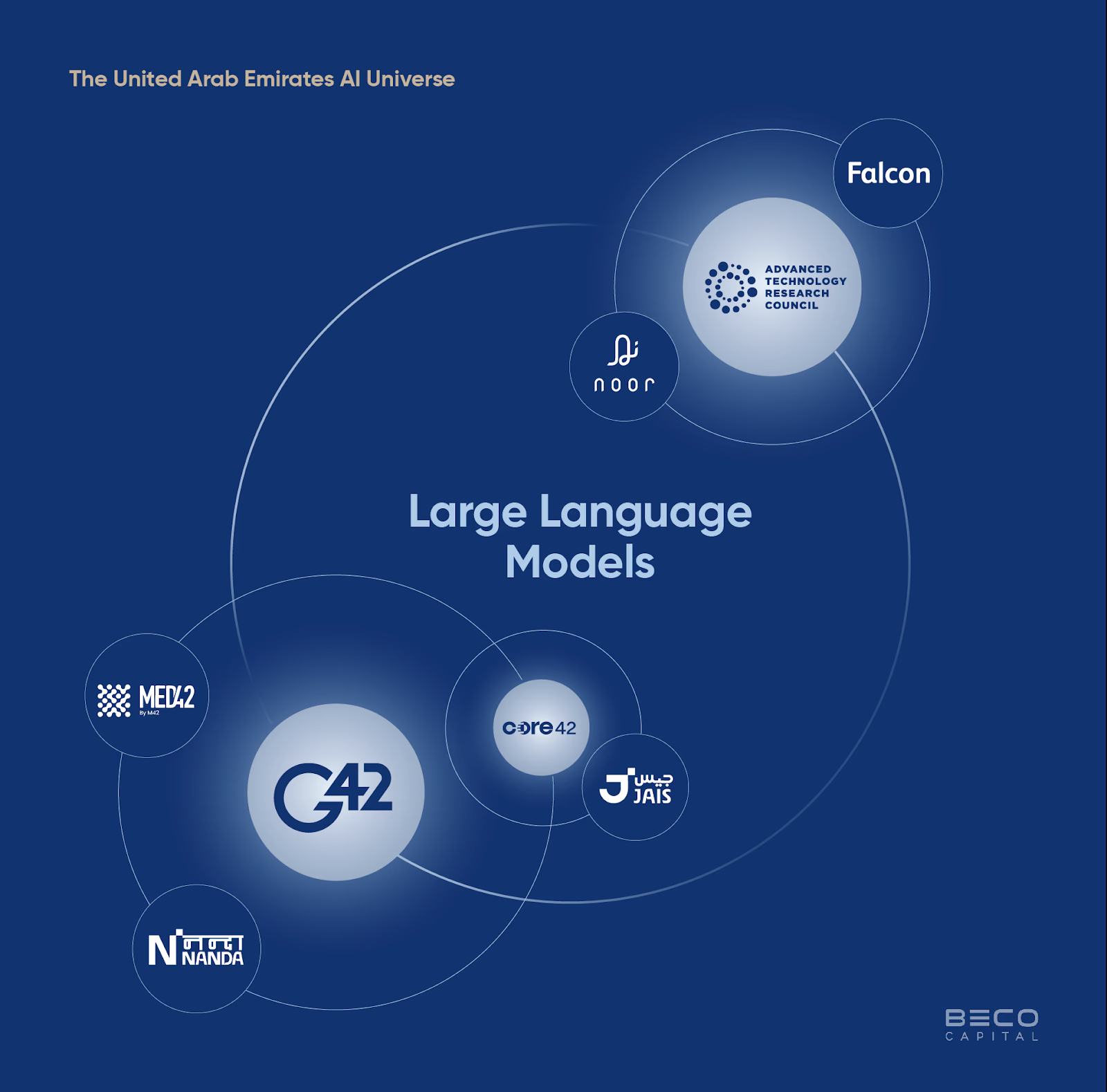
1.3.4 The LLM Ecosystem
The United Arab Emirates has emerged as a leading force in the global Large Language Model (LLM) landscape, driven by strategic investments and partnerships between government entities, technology companies, and research institutions.
The nation’s AI ecosystem showcases a diverse portfolio of LLMs, each addressing specific market needs while advancing the UAE’s position as a hub for artificial intelligence innovation.
TII has established itself as a key player through its Falcon family of LLMs, while equally significant contributions come from other major technology leaders across the ecosystem. G42’s Jais model, which was born from the collaboration between Core42, MBZUAI and Cerebras stands out for its sophisticated bilingual capabilities in English and Arabic, addressing a critical need in the region’s linguistic landscape. In the healthcare sector, M42’s Med42 demonstrates the practical application of AI in specialized domains, while TII’s Noor LLM advances the ecosystem’s capabilities with its focus on Arabic language processing. Inception’s Nanda LLM further demonstrates the UAE’s global approach by specializing in Hindi language capabilities.
SPOTLIGHT: The Falcon Family of LLMs
TII’s development of the Falcon Large Language Models represents a landmark achievement in the UAE’s AI journey. First unveiled in October 2022, the Falcon family has grown to include models of varying sizes – 180B, 40B, 7.5B, and 1.3B parameters – along with their high-quality REFINEDWEB dataset. The models’ performance has been exceptional: Falcon 40B maintained the top position on Hugging Face’s leaderboard for open-source LLMs for two months after its launch (in June 2023), while Falcon 180B achieved a remarkable score of 68.74 (in September 2023), making it the highest-scoring, openly released, pre-trained LLM; surpassing Meta’s LLaMA 2 (67.35).
On December 18th 2024, Falcon launched their newest iteration of Falcon, with the unveiling of Falcon 3, focusing on small LLMs. Falcon 3 boasts enhanced reasoning capabilities and improved fine-tuning, positioning it as a more robust and practical AI solution that is able to run on lightweight systems, such as laptops. Upon launch, Falcon 3 secured the top spot on Hugging Face’s global third-party LLM leaderboard, marking the second time the Falcon family of LLM has topped the global charts. Looking forward, TII announced their plans to embed multimodal functionalities with voice mode that will go live in the new year.
TII’s strategic decision to make these models open-source has been transformative for the global AI community. This approach not only demonstrates the UAE’s technical capabilities but also its commitment to collaborative innovation in AI development. The open-source nature of Falcon has enabled developers worldwide to access, study, and build upon these sophisticated models, accelerating global AI advancement.
The commercialization of Falcon through VentureOne and Locai showcases the UAE’s ability to balance open innovation with practical market applications. Locai has successfully leveraged Falcon’s capabilities to develop sector-specific AI solutions tailored for the MENA region, including Razi for healthcare, Specter for legal services, and Mira for customer experience. This approach exemplifies the UAE’s broader AI strategy: developing world-class technology, making it accessible to the global community, while simultaneously creating practical applications that address specific market needs.
1.4 Future Vision and Impact
1.4.1 Pioneering Foresight
The UAE’s journey from strategic investor to AI pioneer demonstrates how visionary leadership, systematic execution, and commitment to open collaboration can transform ambitious goals into tangible technological leadership.
Rather than simply being a technology adopter, the UAE has emerged as an influential player shaping the future of AI development and implementation.
1.4.2 Global Leadership Outlook
Looking ahead, several factors suggest the UAE’s influence in global AI will continue to grow.
The combination of strategic government support, robust research institutions, commercial enterprises, and a commitment to open-source collaboration creates a sustainable ecosystem for ongoing innovation. The ability to attract both global partnerships and world-class talent, coupled with the region’s increasing reputation as an early adopter of AI technologies, provides a strong foundation for future advancement.
Moreover, the UAE’s position at the crossroads of East and West, combined with its demonstrated ability to balance technological advancement with practical application, makes it well-suited to bridge different approaches to AI development. As AI continues to evolve and reshape industries globally, the UAE’s forward-thinking initiatives and comprehensive ecosystem position it not just as a regional leader, but as a significant contributor to the global AI dialogue.
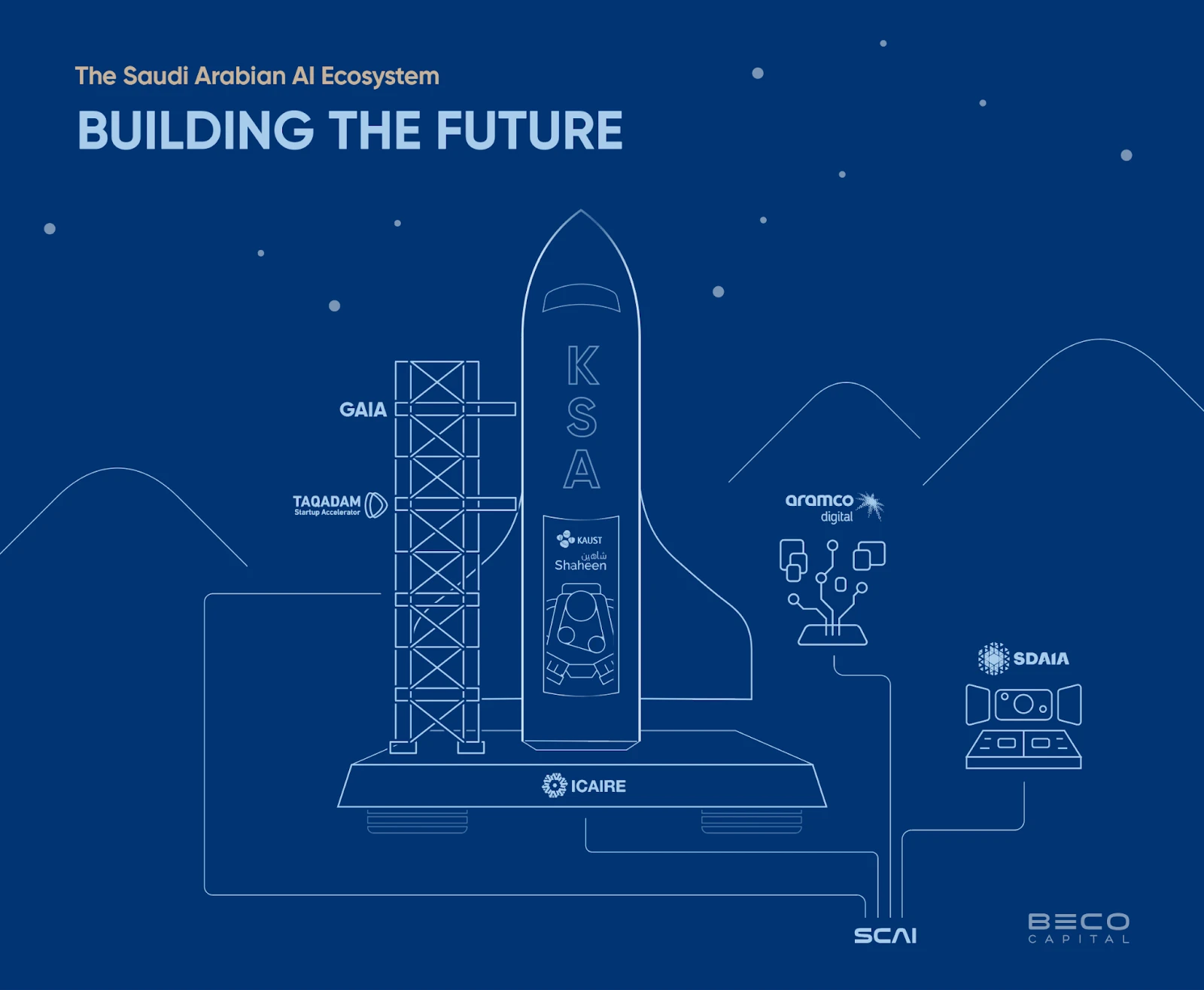
Saudi Arabia
2.1 Building a Rocketship on Its Way to AI Excellence
2.1.1 Vision 2030 Integration
Like the UAE, AI is central to Saudi Arabia’s transformative vision for the future, bridging its ambitious Vision 2030 with the emerging Vision 2050 framework.
This vision reflects the Kingdom’s recognition that AI is not merely a technological tool, but a fundamental driver of economic and social transformation. By integrating AI into the fabric of its economic framework, Saudi Arabia aims to achieve multiple strategic objectives:
diversifying its economy beyond traditional sectors
enhancing public services through digital innovation
developing a skilled workforce capable of thriving in an increasingly technology-driven future
2.1.2 SDAIA Establishment
A pivotal moment came with the establishment of the Saudi Data and Artificial Intelligence Authority (SDAIA) in 2019.
It demonstrated the Kingdom’s commitment to become a global leader in the AI era, and its understanding that successful AI integration requires dedicated governance and oversight.
SDAIA’s creation marked the beginning of a new phase in Saudi Arabia’s technological evolution, providing a centralized authority to drive AI initiatives across public and private sectors. This systematic approach to AI development, supported by significant investments and clear strategic direction, has positioned Saudi Arabia to compete effectively in the global AI landscape, while addressing specific regional needs and opportunities.
2.2 Structuring a Comprehensive AI Ecosystem
2.2.1 Infrastructure Development
Saudi Arabia’s systematic approach to AI development has yielded remarkable results in a short span of time.
The Kingdom now ranks first globally in the government strategy pillar for AI and has surged to 14th place overall in international AI capacity, a dramatic improvement from its previous position of 31st. This rapid ascent reflects not just substantial government investment, but also the successful creation of a robust ecosystem of complementary institutions and initiatives. The Kingdom’s progress is matched by strong public support: 75% of Saudi citizens demonstrate knowledge about AI, while 81% express optimism about its transformative potential across scientific and professional domains. According to the State of AI report, this positive sentiment mirrors growing confidence in AI’s capacity to revolutionize key sectors of the Saudi economy.
SDAIA spearheads the Kingdom’s AI ambitions with a mandate that extends far beyond traditional regulatory oversight. By consolidating over 8,700 datasets from more than 250 government and private entities into its National Data Bank, SDAIA has created a unified data ecosystem that enables AI-driven innovation at a national scale. This centralized approach has proven transformative; through its DEEM platform, which delivers 49 distinct services to over 180 government agencies, SDAIA has generated annual cost savings of approximately $1.5 billion while dramatically improving service delivery and decision-making capabilities across the public sector.
2.2.2 Research Excellence
SDAIA has also established strategic partnerships with global companies like IBM and Microsoft to accelerate its research initiatives.
These collaborations focus on developing Arabic-centric AI models and initiatives, including ALLaM, an open-source Arabic LLM designed to advance Arabic natural language processing.
King Abdullah University of Science and Technology (KAUST) stands as the cornerstone of Saudi Arabia’s AI research infrastructure. Supported by a $2 billion endowment, KAUST has attracted world-class talent including Jurgen Schmidhuber, a pioneer in deep learning and neural networks, and Bernard Ghanem, whose groundbreaking work in computer vision and machine learning is advancing the field of AI.
The university’s commitment to cutting-edge research is exemplified by the recent launch of Shaheen III, the Middle East’s most powerful supercomputer. With 21.2 petaflops of processing power, this facility positions Saudi Arabia at the forefront of computational research and AI development in the region.
The establishment of the International Centre for Artificial Intelligence Research and Ethics (ICAIRE) in Riyadh, in collaboration with the United Nations, further demonstrates Saudi Arabia’s commitment to responsible AI development. This institution ensures that the Kingdom’s technological advancement aligns with international ethical standards while contributing to global discussions on AI governance.
2.3 Implementation and Impact
2.3.1 Industrial Applications
The private sector’s embrace of AI is reshaping traditional industries across the Kingdom.
Aramco Digital, launched in 2023, exemplifies this transformation at an unprecedented scale. The company is driving digital innovation through proprietary platforms that push the boundaries of AI application in the energy sector.
Its multi-cloud platform Nawat provides advanced cloud computing services with built-in AI capabilities, while NourOS serves as a comprehensive AI operating system that enables everything from predictive maintenance to optimization of drilling operations.
The impact of these innovations extends beyond Aramco’s operations; through strategic partnerships like its collaboration with Groq to build the region’s largest inferencing data center, Aramco Digital is helping to establish Saudi Arabia as a powerhouse in industrial AI applications. This approach not only enhances the company’s leadership in the energy sector but also contributes to the broader growth of the Kingdom’s digital economy, through knowledge transfer and ecosystem development.
2.3.2 Economic Transformation
Complementing SDAIA’s infrastructural and regulatory role, the Saudi Company for Artificial Intelligence (SCAI) serves as the Kingdom’s implementation arm for AI technology.
SCAI’s strategic partnership with SenseTime, backed by a $206 million investment, exemplifies its approach to accelerating AI adoption. Through this and other collaborations, SCAI is bringing advanced AI solutions to critical sectors: developing predictive healthcare systems that improve patient outcomes, creating personalized learning platforms that enhance educational effectiveness, and implementing smart city technologies that optimize everything from traffic flow to energy consumption. These practical applications demonstrate how Saudi Arabia is translating its AI investments into tangible improvements in citizens’ daily lives.
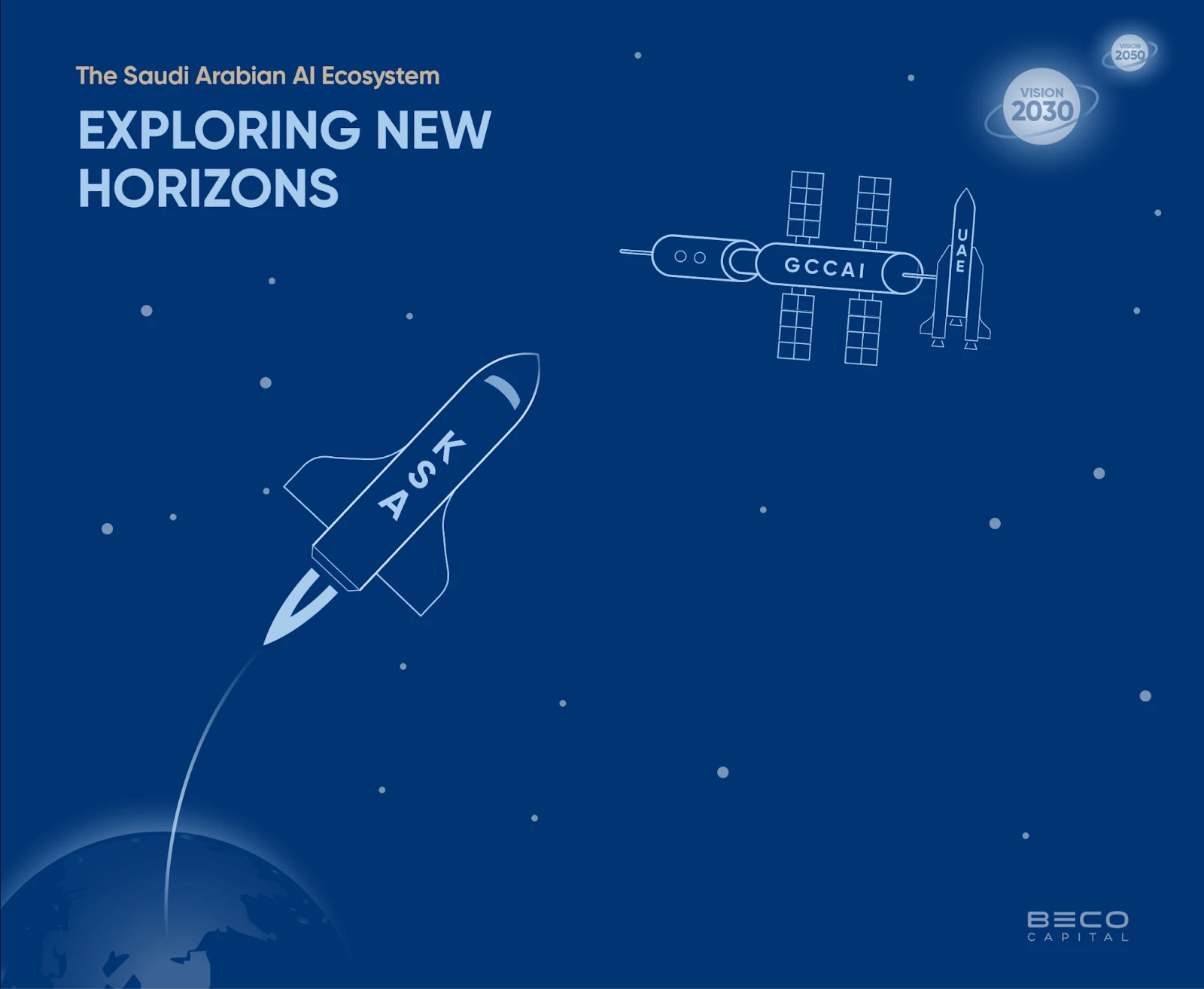
2.4 Future Trajectory
2.4.1 Investment Initiatives
The Kingdom’s commitment to nurturing AI innovation is perhaps most visible in its support for startups and entrepreneurs.
The GAIA Accelerator, backed by a $1 billion investment, is supporting AI startups across 19 countries, while KAUST’s TAQADAM Accelerator provides substantial funding and mentorship to early-stage companies developing AI solutions.
2.4.2 Economic Projections
Looking ahead, Saudi Arabia’s systematic approach to AI development is expected to yield significant economic benefits, with AI projected to contribute $15 billion to the Kingdom’s GDP by 2030.
This impact will be driven by the integration of AI across key economic sectors, the development of new AI-enabled industries, and the creation of high-skilled jobs in the technology sector.
As Saudi Arabia continues to execute its ambitious AI strategy, the Kingdom is positioning itself not just as a regional leader but as a global force in AI development and innovation. Through careful planning, substantial investment, and strategic partnerships, Saudi Arabia is building an AI ecosystem that balances technological advancement with ethical considerations and social impact, setting a new standard for AI development in the region and beyond.
3. Building an AI Future, Our Way
The emergence of the United Arab Emirates and Saudi Arabia as AI powerhouses represents more than individual national achievements; it signals a fundamental shift in the global AI landscape.
The nations have moved decisively beyond their traditional roles as technology consumers to become architects of the AI future, each bringing distinct yet complementary approaches to this transformation that will resonate through the region and beyond. They have thoughtfully taken advantage of their low cost base of energy infrastructure to focus on building AI infrastructure and clusters to power this next wave of compute intensive workloads.
The UAE’s ecosystem-driven model and Saudi Arabia’s centralized transformation strategy demonstrate how different paths can lead to technological leadership. Their combined momentum, backed by clear vision and unwavering commitment from forward-thinking leadership, suggests that the Gulf will play an increasingly pivotal role in shaping the next wave of AI innovation.
As our region continues to attract global partnerships, nurture local talent, and drive technological advancement, together, we are not just participating in the AI revolution – we are actively writing its next chapter. As early stage venture capital investors, BECO is very excited about participating in this new wave of innovation with deeply technical founders who will emerge from the region and build global solutions.